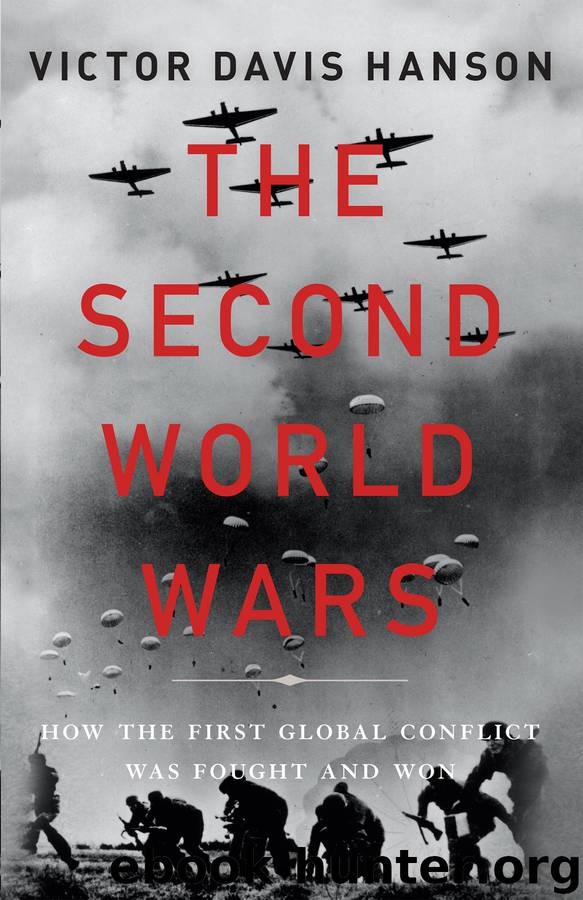The Second World Wars by Victor Davis Hanson

Author:Victor Davis Hanson
Language: eng
Format: epub
Publisher: Basic Books
Published: 2017-10-17T04:00:00+00:00
THE FORTIFIED EASTERN Libyan harbor of Tobruk changed hands four times during the war. Before 1940 and after 1943 the port was little known and of no real strategic importance, as it is a backwater today for the occasional visitor to war-torn Libya. But for a brief two and a half years, Tobruk became renowned as the center of fierce Allied-Axis fighting along the Libyan-Egyptian border.
The Italians initially surrendered Tobruk to the British on January 22, 1940. The British and Dominion forces then held it heroically against attacks, as the port served as a key British base of operations for seventeen months until June 21, 1942, when a German and Italian army under Colonel-General Erwin Rommel stormed the city. But just five months after Rommel’s feat, the Germans themselves abandoned Tobruk on November 12, 1942, as Rommel’s forces fled westward in hasty retreat after their defeat at the second battle of El Alamein.36
Tobruk’s value was that it was almost exactly halfway in the vast 650-mile mostly empty seaside expanse between the British port of Alexandria to the east and the Italian harbor at Benghazi to the west. Each side saw its alternating possession of Tobruk as proof that it had reached a point halfway to its destination, whether British-held Alexandria or Axis-occupied Benghazi. Along the huge Libyan and Egyptian coastal battlefront, it offered the only developed harbor where sizable ships could unload.37
For the Axis, Tobruk was also at the end of a near-perfect north-south vertical line across the Mediterranean, from German-held Athens through Crete to North Africa. Nothing much had changed from antiquity, when Tobruk was known as Antipyrgos—directly “opposite from Pyrgos,” the key ancient Greek port in southern Crete. For the British as well, Tobruk marked an equally straight but quite different latitudinal supply route from Alexandria to Malta. The war in a desolate eastern North Africa hinged on supplying fuel, food, and ammunition along these two antithetical lines, given that there was little support to be had from either indigenous towns or the desert.
After the Germans’ capture of Tobruk on June 21, 1942—one of the last great victories of the Axis—Rommel dreamed of using the port and its captured stocks to supply his smaller army in a reenergized race eastward. For a brief moment in midsummer 1942, Germany saw second-chance glimpses of grand victory. The old fantasy of grabbing the British naval base at Alexandria, Egypt, and cutting off entirely the British in Cairo now seemed to seduce the Germans. From there, Rommel thought that he might even storm the Suez Canal and cut off Britain from its direct routes to its Middle East oil supplies. And Rommel dreamed even more grandly that his tiny Afrika Korps then could continue eastward to join a victorious Army Group South descending from the Black Sea and the Caucasus. If the German armies met in the oil-rich Middle East, then both Russia and Britain would be denied almost all their Persian Gulf or Caspian Sea oil. Or so Rommel imagined after
Download
This site does not store any files on its server. We only index and link to content provided by other sites. Please contact the content providers to delete copyright contents if any and email us, we'll remove relevant links or contents immediately.
| Africa | Americas |
| Arctic & Antarctica | Asia |
| Australia & Oceania | Europe |
| Middle East | Russia |
| United States | World |
| Ancient Civilizations | Military |
| Historical Study & Educational Resources |
Room 212 by Kate Stewart(4193)
The Crown by Robert Lacey(4177)
Endurance: Shackleton's Incredible Voyage by Alfred Lansing(3941)
The Iron Duke by The Iron Duke(3713)
The Rape of Nanking by Iris Chang(3617)
Killing England by Bill O'Reilly(3523)
Joan of Arc by Mary Gordon(3358)
Say Nothing by Patrick Radden Keefe(3171)
I'll Give You the Sun by Jandy Nelson(2901)
Shadow of Night by Deborah Harkness(2821)
Hitler's Monsters by Eric Kurlander(2800)
Mary, Queen of Scots, and the Murder of Lord Darnley by Alison Weir(2733)
Margaret Thatcher: The Autobiography by Thatcher Margaret(2729)
Darkest Hour by Anthony McCarten(2704)
Blood and Sand by Alex Von Tunzelmann(2677)
Red Famine: Stalin's War on Ukraine by Anne Applebaum(2524)
Eleanor & Park by Rainbow Rowell(2469)
The One Memory of Flora Banks by Emily Barr(2418)
Book of Life by Deborah Harkness(2335)
